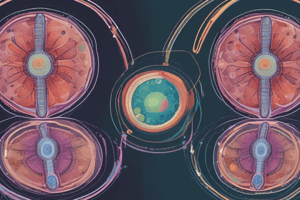Podcast
Questions and Answers
What is the main purpose of mitosis in multicellular organisms?
What is the main purpose of mitosis in multicellular organisms?
- Result in genetically unique daughter cells
- Facilitate growth and repair (correct)
- Increase genetic diversity
- Produce sex cells
Which event occurs during prophase of mitosis?
Which event occurs during prophase of mitosis?
- Spindle fibers form (correct)
- Cell divides
- Chromosomes align at the metaphase plate
- Chromosomes separate
How does meiosis differ from mitosis in terms of daughter cells produced?
How does meiosis differ from mitosis in terms of daughter cells produced?
- Meiosis leads to two diploid daughter cells
- Meiosis produces genetically identical daughter cells
- Meiosis results in four haploid daughter cells (correct)
- Meiosis does not involve chromosome separation
What is a key characteristic of eukaryotic cells during mitosis?
What is a key characteristic of eukaryotic cells during mitosis?
Which process occurs in prokaryotes during cell division?
Which process occurs in prokaryotes during cell division?
Why are cells described as fundamental units of life?
Why are cells described as fundamental units of life?
Which process is responsible for cells reproducing their genetic material?
Which process is responsible for cells reproducing their genetic material?
What is the main significance of cell division?
What is the main significance of cell division?
What is the primary role of mitosis in cell division?
What is the primary role of mitosis in cell division?
In the context of cell division, what distinguishes meiosis from mitosis?
In the context of cell division, what distinguishes meiosis from mitosis?
How does the concept of cell division relate to the cell theory?
How does the concept of cell division relate to the cell theory?
Which statement best captures the significance of cell division in multicellular organisms?
Which statement best captures the significance of cell division in multicellular organisms?
Flashcards are hidden until you start studying
Study Notes
The Fundamental Unit of Life: Cells and Division
At the heart of all living organisms, you'll find the smallest, yet most incredible structures called cells. Each cell contains the blueprint for life — its genetic information, metabolic processes, and the ability to grow, respond to its environment, and reproduce. In this article, we'll delve into the concept of cells as the fundamental unit of life, with a special focus on cell division, a critical process that allows life to flourish.
Cells: The Building Blocks of Life
Cells, discovered in the 17th century, are the smallest units that can exist as independent living organizational units. They're found in all living organisms, from unicellular microorganisms like bacteria to multicellular organisms like humans. Cells come in various shapes and sizes, with some of the smallest, like bacteria, measuring only a few micrometers, while others, like liver cells, can grow to several tens of micrometers in size.
The Cell Theory
The cell theory, first proposed in the 19th century, states that:
- All living organisms are made up of cells.
- Cells are the basic units of structure and function for living organisms.
- New cells are formed only from existing cells through cell division.
Cell Division
Cell division, also known as mitosis or meiosis, is the process by which cells reproduce their genetic material, allowing life to grow and propagate. During cell division, a parent cell divides into two daughter cells, each with the same genetic information as its parent but with half the amount of genetic material in multicellular organisms.
There are two main types of cell division: mitosis and meiosis.
- Mitosis: Occurs in somatic (body) cells and results in two genetically identical daughter cells. Mitosis ensures growth and repair in multicellular organisms.
- Meiosis: Occurs in germ cells and results in four genetically unique haploid (half the number of chromosomes) daughter cells. Meiosis leads to the production of sex cells (eggs and sperm), allowing sexual reproduction and genetic variation.
Key Events of Mitosis
- Prophase: The chromosomes condense, and the nuclear envelope breaks down.
- Prometaphase: Spindle fibers form, and chromosomes attach to the spindle fibers.
- Metaphase: Chromosomes align at the metaphase plate.
- Anaphase: Chromosomes separate, and sister chromatids move toward opposite poles.
- Telophase: Chromosomes decondense, and nuclei form. The nuclear envelope reforms, and the cell divides.
Cell Division in Eukaryotes and Prokaryotes
Cell division processes differ between eukaryotes and prokaryotes:
- Eukaryotes: Cells contain a membrane-bound nucleus and organelles. During mitosis, the nuclear envelope breaks down, and the chromosomes condense into visible structures.
- Prokaryotes: Cells do not have a membrane-bound nucleus and organelles. During cell division, DNA replication occurs continuously, and the cytoplasm divides by the invagination of the plasma membrane.
Conclusion
Cells, and their ability to divide, are the fundamental units of life. They allow living organisms to grow, reproduce, and adapt. Understanding cell division and its processes is crucial in studying life at its most basic level, from the smallest microorganisms to the most complex multicellular organisms. As we continue to explore the wonders of life, cells will remain the building blocks at the heart of our discoveries.
Studying That Suits You
Use AI to generate personalized quizzes and flashcards to suit your learning preferences.




